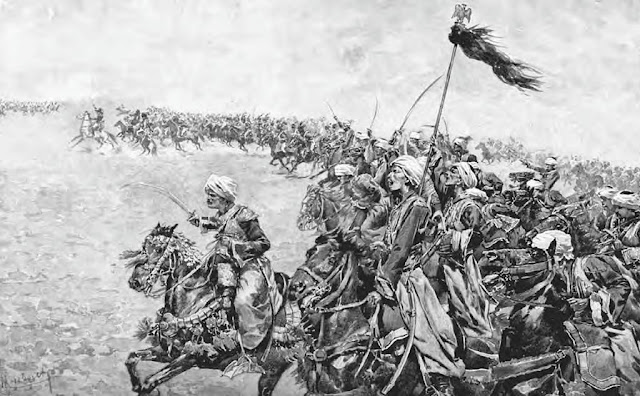The Achaemenid Persian Empire established the largest land Empire the ancient world had ever seen until the rise of Alexander the Great. More than the largest land empire, it could also boast itself as the largest economy in the ancient world with various luxury goods and commodities traded in the market and employment given in many works provided by the imperial government.
Friday, November 30, 2018
Sunday, October 7, 2018
Sunday, September 30, 2018
Friday, August 31, 2018
Founders: Who was Chandragupta Maurya?
As Alexander the Great’s Generals carved out their own kingdoms from the vast Macedonian Empire, it sent ripple effects that led to a creation of another empire in India. The mysterious Chandragupta Maurya (r. 321 - 297 BCE) emerged from obscurity, established his own dynasty that ruled over much of modern India for more than a century.
 |
| Chandragupta Maurya entertains his bride from Babylon |
Saturday, July 14, 2018
Japan, Fabians, and Nehru’s Economic Ideas
 |
| Nehru in London, 1911 (From the Selected Works of Nehru) |
Prime Minister Jawaharlal Nehru leaned towards socialism in hope to solve India’s dire poverty situation. His premiership saw government taking the commanding heights of the the economy through series of five year plans to promote industrialization. This belief towards state ownership, planning, and socialism traced its roots from his years studying in England.
Sunday, July 8, 2018
Sunday, July 1, 2018
Sunday, June 24, 2018
The Spirit of Bandung: A Summary of the Bandung Declaration of 1955
Representatives and leaders from 29 countries convened in
the Merdeka Building in Bandung, Indonesia upon the invitation of the Colombo
Powers to unite newly independent countries to form a third block of neutral
countries in conflict between 2 superpowers. At the end of the conference, they
released the Bandung final communiqué – the conclusion of the 6-day event.
Sunday, June 10, 2018
Saturday, June 2, 2018
What happened in the Bandung Conference?
In the midst of the Cold War, a battle of ideology between the United States and the Soviet Union, the world’s young and new nations of Asia and Africa fell victim to the rivalry of the two superpowers. They decided to take a stand in April 1955 in a conference in Bandung, Indonesia.
Sunday, May 20, 2018
Sunday, May 13, 2018
Saturday, May 5, 2018
President Diaz and His Controversial Economic Development - Part 1
Porfirio Diaz’s presidency has been criticized as an authoritarian president who brought the common Mexican people to its knees while his close associates enrich themselves with the wealth of the country sold to foreigner. This overshadowed the fact Mexico grew from the dark chaotic shadows of 18th century.
Saturday, April 28, 2018
Saturday, April 21, 2018
Monday, April 9, 2018
Sunday, April 1, 2018
Thursday, March 29, 2018
Who were the Buyids?
As the power of the Abbasid Caliphs
wavered, ambitious generals and officials rose to power in their localities and
set out to create their own dominions and empires. One such clan – the Buyids -
embodied the divide during the period and the illustrated the political
impotency of the Abbasid Caliphs.
Sunday, March 18, 2018
Saturday, March 10, 2018
Founders: Who were Caliphs as-Saffah and al-Mansur?
In 749, in the city
of Kufa, the Islamic world founded another Caliphate – the Abbasids. And the
foundation and security of this new Caliphate rested in its first 2 Caliphs,
both considered founders of the new dynasty – Caliph As-Saffah and Caliph
al-Mansur.
Saturday, March 3, 2018
Sunday, February 18, 2018
Who was Harun al-Rashid?

Ruled
as the 5th Abbasid Caliph (r. 785 – 809), Harun al-Rashid ibn Muhammad al-Mahdi
(763/766 – 809) presided over an explosive era of great achievements for the
Islamic civilization, but his reign also began the decline of the Abbasid Caliphate.
Sunday, February 11, 2018
A Brief History of the Abbasid Caliphate
The
Abbasid Caliphate (750 - 1258) stood was a great Islamic Empire that dominated
two continents. Founded through revolution, it presided over a golden age until
it declined due to intrigue, war, and weakness that led to its centuries of
powerless existence until its downfall in the hands of the Mongols.
Wednesday, January 31, 2018
Sunday, January 21, 2018
Who were the Mawali?
Islam promised a community
(Umma in Arabic) united and equal regardless of race. But the Umayyad Caliphate
granted anything but that. Its desire to unite the Caliphate under Arabic
culture led to the creation of a whole new class of Muslims that do not share
Arabic blood. They became known as the Mawali.
Saturday, January 13, 2018
Saturday, January 6, 2018
Subscribe to:
Comments (Atom)

























